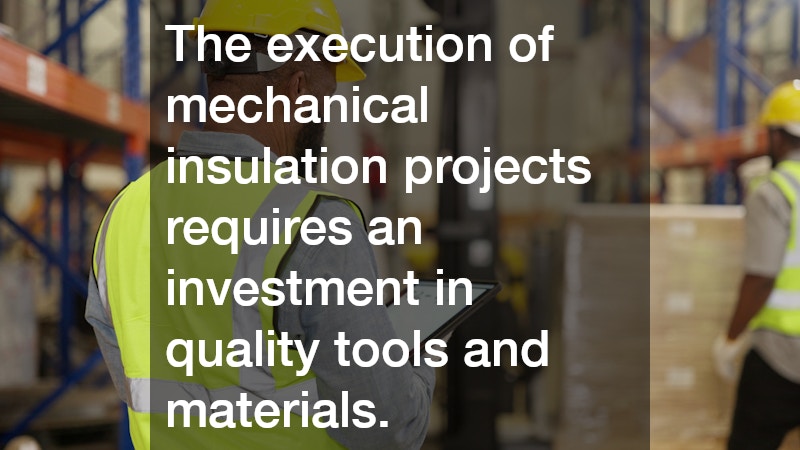Mechanical insulation contracting plays a significant role in the construction industry, providing thermal, acoustic, and protective benefits to various systems and structures. It is essential for energy efficiency, safety, and cost savings, which makes it a critical component of modern building projects. For new contractors, the field offers substantial opportunities for specialization and growth, making it a rewarding career choice.
What Are the Essential Skills and Qualifications Required?
Understanding Industry Standards and Regulations
To begin a successful career in mechanical insulation contracting, acquiring the necessary skills and certifications is paramount. Understanding industry standards and regulations is crucial as it ensures compliance and quality assurance in every project handled. Contractors must be familiar with materials such as fiberglass, mineral wool, and foam, their applications, and the standards governing their use.
Engaging in continuous education is indispensable as it helps contractors stay abreast of new technologies, materials, and methods in mechanical insulation. Certification programs such as those offered by the National Insulation Association (NIA) are valuable for enhancing credibility and competence. Furthermore, hands-on experience supplements theoretical knowledge, forming a holistic skill set for effective project execution.
Networking within professional circles can also advance a contractor’s understanding of evolving industry norms, aiding in maintaining compliance and delivering quality workmanship. This professional engagement additionally creates opportunities for mentorship, knowledge exchange, and partnership in tackling complex tasks. These elements collectively fortify the foundation required for anyone venturing into this specialized contracting field.
How to Identify and Secure Projects?
Networking and Building Client Relationships
Identifying and securing projects in mechanical insulation contracting demands strategic networking and relationship-building. Active participation in industry events, trade shows, and workshops opens doors to potential clients and project opportunities. Building a solid client relationship foundation increases trust and the likelihood of repeat business and referrals.
Beyond networking events, contractors should also leverage digital platforms and professional social networks to widen their reach. Showcasing successful projects and demonstrating expertise through high-quality content can attract new clients and foster reliance among existing ones. A well-maintained online presence can thus serve as a potent tool for ongoing engagement and project acquisition.
Leveraging word-of-mouth referrals through satisfied clients remains a traditional yet powerful approach in acquiring new contracts. Providing exceptional service and ensuring client satisfaction can result in positive reviews and recommendations, enhancing a contractor’s reputation. These strategies are integral in identifying and securing lucrative projects in this competitive industry.
What Kind of Equipment and Materials Are Needed?
Investing in Quality Tools and Supplies
The execution of mechanical insulation projects requires an investment in quality tools and materials. Durable hand tools such as cutters, knives, and crimpers are essential for precision and efficiency in insulation tasks. Additionally, contractors must choose reliable insulation products that align with industry standards and the specific needs of each project.
Power tools and equipment like insulation vacuums, blowers, and pumps can enhance productivity and safety on the job site. It is crucial to select these items based on performance, safety features, and ease of maintenance to ensure they contribute positively to the project’s quality. In fact, according to some industry estimates, investing in high-quality tools can decrease project timelines by as much as 20%, leading to significant cost-saving benefits.
Beyond physical tools, adopting modern project management software can streamline scheduling, resource allocation, and communication. These software solutions provide operational insights, helping contractors maintain control over project timelines and delivery. Collectively, these investments lay the groundwork for successful project outcomes, catering to both client satisfaction and operational excellence.
How to Ensure Safety and Quality in Mechanical Insulation Work?
Implementing Best Practices and Safety Protocols
Ensuring safety in mechanical insulation work involves adhering strictly to established safety protocols and industry best practices. Contractors must conduct regular training sessions to educate workers on safety measures, potential hazards, and emergency responses. Emphasis on wearing appropriate personal protective equipment (PPE) is also necessary to mitigate risks and protect workers’ health.
A disciplined approach to project planning and risk assessment is instrumental in identifying potential safety challenges and developing effective mitigation strategies. Regular site inspections and audits can help in maintaining the prescribed safety standards and ensuring compliance with regulations. These efforts contribute significantly to achieving zero-incident records and fostering a culture of safety and accountability in the workplace.
Quality assurance is equally imperative, requiring contractors to implement robust systems for monitoring and evaluating project outcomes. This involves verifying installations for conformance with design specifications and industry standards, thereby ensuring durability and performance. Continual feedback and improvement processes aid in maintaining excellence, enhancing client satisfaction, and securing future business opportunities.
In conclusion, entering the mechanical insulation contracting industry offers a blend of challenges and opportunities for those prepared to meet its demands. Mastering the requisite skills, understanding industry standards, and investing in quality equipment are vital steps toward success. Contractors must also foster strong client relationships and employ effective safety and quality practices to thrive in this field. Ultimately, staying informed and adaptable in the face of evolving industry trends and technologies will ensure sustained success and growth in mechanical insulation contracting.

